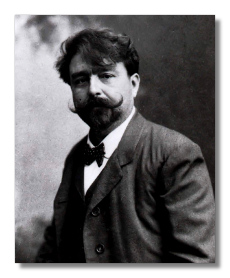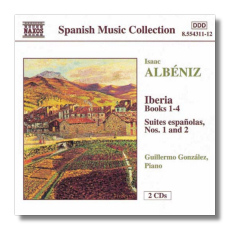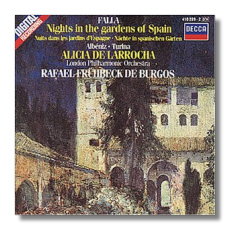
The Internet's Premier Classical Music Source
Related Links
-
Find CDs & Downloads
Amazon - UK - Germany - Canada - France - Japan
ArkivMusic - CD Universe
Find DVDs & Blu-ray
Amazon - UK - Germany - Canada - France - Japan
ArkivMusic-Video Universe
Find Scores & Sheet Music
Sheet Music Plus -
- Alhambrismo! - Life & Music of Albéniz by Yale Fineman
- Albéniz Foundation
Recommended Links
Site News
Isaac Albéniz

(1860 - 1909)
One of Spain's most important composers, Isaac Albéniz (May 29, 1860 - June 16, 1909) was born in the town of Camprodon in Catalonia. He was a child prodigy who first performed publically on the piano at age four. By age seven he was studying at the Conservatory, at age eight, performing in various Catalan cities and towns wherever his father, a civil servant, was stationed. By the time he was a teenager Albéniz gained a reputation as a virtuoso panist, and word of his talents soon reached Madrid. He subsequenetly was awarded a royal pension to study at the Royal Conservatory in Brussels.
He had a clear calling to be a pianist from such an early age. Though Catalan at heart, in his music Albéniz introduced into his works the musical idioms native to the Andalusia region of the southern Iberian peninsula creating a synthesis of Spanish styles with contemporary European music developments. Even the titles of his works evoke images of his native land.
Albéniz died before he could finish his last and most famous work, an extended set of "impressions" for solo piano in four books titled Ibéria consists of 12 "scenes" from different regions of the country. The remaining works in the set were completed by Enrique Granados. Among his most enduringly popular pieces is the guitar prelude Asturias (Leyenda) from Cantos de Espaņa, originally written as a standalone piece, but later incorporated as #5 of the Suite española of 1886, with movements titled "Granada" and "Sevilla". The Rapsodia española for piano and orchestra completed the following year has also remianed in the repertoire.

Recommended Recordings
Ibéria
- "Ibéria"/London 417887-2
-
Alicia De Larrocha (piano)
- "Ibéria" with Granados/London Double Decca 448191-2
-
Alicia De Larrocha (piano)
- "Ibéria"/Ensayo 9712
-
Esteban Sánchez (piano)
- "Ibéria", Suite española #1 & 2, Op. 47/Naxos 8.554311/2
-
Guillermo González (piano)
Suite española, Op. 47
- Suite española #1 & 2/London 417887-2
-
Alicia De Larrocha (piano)
- Suite española #1 & 2, Ibéria/Naxos 8.554311/2
-
Guillermo González (piano)
Rapsodia española, Op. 70
- "Rapsodia española" with Turina & de Falla/London 410289-2
-
Alicia De Larrocha (piano), Rafael Frühbeck de Burgos/London Philharmonic Orchestra
- "Rapsodia española", Concierto fantástico with Turina & de Falla/Erato 0630-14775-2 or Apex 8573-89223-2
-
Jean-François Heisser (piano), Jésus López-Cobos/Lausanne Chamber Orchestra
















